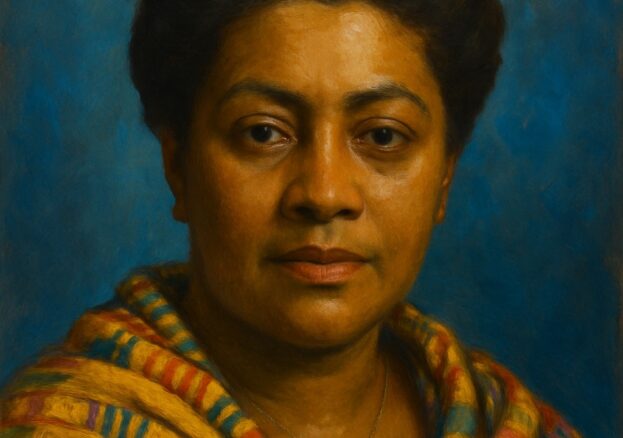
Amy Ashwood Garvey (1897–1969) remains one of the most remarkable yet overlooked figures in twentieth-century Black history. She co-founded the Universal Negro Improvement Association (UNIA), became a pioneering Pan-Africanist, and was one of the first voices to insist that women must stand at the centre of the freedom struggle. Her life stretched from Jamaica to Harlem, from London to Africa, and wherever she went she carried the conviction that liberation must be global, inclusive, and just.
 Born in Port Antonio, Jamaica, she grew up in a family that valued education and community service. From a young age she showed independence of mind and a refusal to accept the limits society placed on women. In Kingston she met Marcus Garvey, then a young printer with ambitious ideas about racial pride and self-determination. Together, in 1914, they founded the UNIA. Ashwood drafted its first constitution, served as secretary, and began to shape what would become the largest mass organisation of Black people in the modern era.
Born in Port Antonio, Jamaica, she grew up in a family that valued education and community service. From a young age she showed independence of mind and a refusal to accept the limits society placed on women. In Kingston she met Marcus Garvey, then a young printer with ambitious ideas about racial pride and self-determination. Together, in 1914, they founded the UNIA. Ashwood drafted its first constitution, served as secretary, and began to shape what would become the largest mass organisation of Black people in the modern era.
When Garvey left for the United States in 1916, Ashwood soon followed. In Harlem she worked tirelessly as the UNIA spread across the Caribbean, North America, Europe, and Africa. She insisted that women could not remain in the background, once declaring: “I do not see why I should be in the background… I regard myself as equal to any man.” In an age when male leaders dominated the stage, her voice was strikingly bold.
Her marriage to Garvey in 1919 was short-lived, but her political commitment never wavered. Rather than retreat, she built her own identity as a lecturer, organiser, and activist, carving out space for women to be recognised as leaders in their own right.
It was in London that Ashwood came most fully into her own. Arriving in the 1930s, she turned her home into a meeting place for exiled activists, African students, and intellectuals. George Padmore, C. L. R. James, Jomo Kenyatta, and Kwame Nkrumah — all key figures in anti-colonial politics — passed through her doors. London at that time was a hub for anti-imperial debate, and Ashwood was at its centre.
She also built cultural spaces that celebrated Black identity. The Florence Mills Social Club in Soho became a lively hub for artists and campaigners. Later, she founded the Afro-Women’s Centre, creating a platform where women could speak, organise, and take pride in their heritage. She was relentless in linking culture with politics, understanding that liberation required dignity and self-confidence as much as laws and votes.
Her feminism was years ahead of its time. Speaking of Caribbean women, she insisted: “Our women have been neglected, but we are determined that we shall have our rightful place in the rebuilding of our countries.” At a moment when colonial rulers ignored women’s rights — and even some male nationalists dismissed them — her words were radical and courageous.
Her most visible role came in October 1945 at the Fifth Pan-African Congress in Manchester, now remembered as a turning point in the struggle against colonialism. The gathering brought together leaders who would go on to guide African nations to independence, among them Nkrumah of Ghana and Kenyatta of Kenya. Amy Ashwood Garvey was one of only a few women who addressed the Congress. She reminded delegates that history had sidelined half the population, stating: “Much has been written about Black people, but very little has been said about Black women — too often pushed into the background as mere child-bearers.” At a moment that helped set the course for Africa’s future, she made sure that women’s voices could not be silenced.
In the years that followed, Ashwood continued to travel between London, Africa, and the Caribbean. She spoke, lectured, and campaigned for women’s rights, Pan-African unity, and cultural pride. Long before the phrase “Black feminism” existed, she was articulating its principles, rooted in lived experience and unflinching conviction.
She died in 1969, too often remembered only as Marcus Garvey’s first wife. But she was far more than that: a builder of movements, a champion of women, and a vital link between continents.
As Black History Month 2025 reflects on the theme Standing Firm in Power and Pride, her life is a vivid example. She stood firm against racism, colonialism, and sexism, and carried herself with pride as a Jamaican woman determined that the struggle for freedom would be shared equally by men and women alike. Her words still carry a fierce urgency: “Our women have been neglected… but we shall have our rightful place.”
References & Further Reading
-
Sherwood, Marika. Amy Ashwood Garvey, Pan-Africanist, Feminist and Mrs Marcus Garvey No. 1, Or, A Tale of Two Amies. London: New Beacon Books, 1995.
The definitive biography of Amy Ashwood Garvey.
URL: https://www.newbeaconbooks.com/ -
Adi, Hakim & Sherwood, Marika. Pan-African History: Political Figures from Africa and the Diaspora since 1787. Routledge, 2003.
Includes a section on Ashwood Garvey’s role in London Pan-African politics.
URL: https://www.routledge.com/Pan-African-History-Political-Figures-from-Africa-and-the-Diaspora-since/Adi-Sherwood/p/book/9780415326023 -
University of Manchester Library. Pan-African Congress 1945 Archive.
Contains original documents and context about the Manchester Congress where Ashwood Garvey spoke.
URL: https://www.library.manchester.ac.uk/rylands/using-the-library/study/pan-african-congress/ -
British Library – Untold Lives Blog. Black Women and Pan-Africanism.
Features articles on Amy Ashwood Garvey and her activism in London.
URL: https://blogs.bl.uk/untoldlives/ -
Wikipedia. Amy Ashwood Garvey.
General overview with links to references and further resources.
URL: https://en.wikipedia.org/wiki/Amy_Ashwood_Garvey
